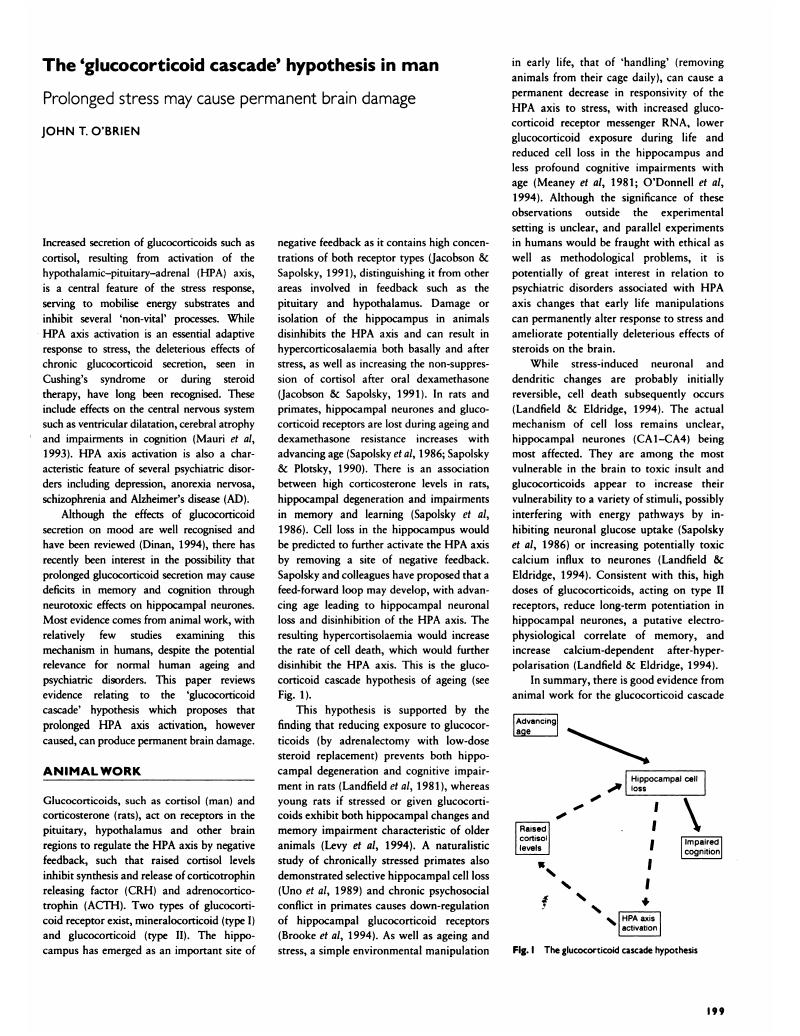Crossref Citations
This article has been cited by the following publications. This list is generated based on data provided by Crossref.
Mitchell, Alexander J.
1997.
Clinical implications of poststroke hypothalamo-pituitary adrenal axis dysfunction: A critical literature review.
Journal of Stroke and Cerebrovascular Diseases,
Vol. 6,
Issue. 6,
p.
377.
Williams, Justin H. G.
1998.
Using behavioural ecology to understand depression.
British Journal of Psychiatry,
Vol. 173,
Issue. 6,
p.
453.
Breathnach, CS
1998.
Normal ageing and the brain.
Irish Journal of Psychological Medicine,
Vol. 15,
Issue. 1,
p.
26.
Roth, Martin
and
Kay, D. W. K.
1998.
Late paraphrenia: a variant of schizophrenia manifest in late life or an organic clinical syndrome? A review of recent evidence.
International Journal of Geriatric Psychiatry,
Vol. 13,
Issue. 11,
p.
775.
Markowitsch, Hans J.
Kessler, Josef
Van Der Ven, Christian
Weber-Luxenburger, Gerald
Albers, Manfred
and
Heiss, Wolf-Dieter
1998.
Psychic trauma causing grossly reduced brain metabolism and cognitive deterioration.
Neuropsychologia,
Vol. 36,
Issue. 1,
p.
77.
Deary, Ian J.
Starr, John M.
and
Maclennan, W.J.
1998.
Fluid intelligence, memory and blood pressure in cognitive aging.
Personality and Individual Differences,
Vol. 25,
Issue. 4,
p.
605.
Davies, N.
Russell, A.
Jones, P.
and
Murray, R.M.
1998.
Which characteristics of schizophrenia predate psychosis?.
Journal of Psychiatric Research,
Vol. 32,
Issue. 3-4,
p.
121.
Keshavan, Matcheri S
Haas, Gretchen L
Kahn, Charles E
Eduardo Aguilar
Dick, Elizabeth L
Schooler, Nina R
Sweeney, John A
and
Pettegrew, Jay W
1998.
Superior temporal gyrus and the course of early schizophrenia: Progressive, static, or reversible?.
Journal of Psychiatric Research,
Vol. 32,
Issue. 3-4,
p.
161.
Luts, A.
Jönsson, S. A. T.
Guldberg‐Kjaer, N.
and
Brun, A.
1998.
Uniform abnormalities in the hippocampus of five chronic schizophrenic men compared with age‐matched controls.
Acta Psychiatrica Scandinavica,
Vol. 98,
Issue. 1,
p.
60.
Wolkowitz, Owen M.
and
Reus, Victor I.
1999.
Treatment of Depression With Antiglucocorticoid Drugs.
Psychosomatic Medicine,
Vol. 61,
Issue. 5,
p.
698.
O'Brien, John T.
1999.
Age-associated memory impairment and related disorders.
Advances in Psychiatric Treatment,
Vol. 5,
Issue. 4,
p.
279.
Sharpe, Paul
and
Hanning, Christopher
1999.
Neurological sequelae.
Best Practice & Research Clinical Anaesthesiology,
Vol. 13,
Issue. 3,
p.
451.
Markowitsch, Hans J.
1999.
Neuroimaging and mechanisms of brain function in psychiatric disorders.
Current Opinion in Psychiatry,
Vol. 12,
Issue. 3,
p.
331.
Pálsson, Sigurdur
Aevarsson, Ólafur
and
Skoog, Ingmar
1999.
Depression, cerebral atrophy, cognitive performance and incidence of dementia.
British Journal of Psychiatry,
Vol. 174,
Issue. 3,
p.
249.
Starr, John M.
1999.
Blood pressure and cognitive decline in the elderly.
Current Opinion in Nephrology and Hypertension,
Vol. 8,
Issue. 3,
p.
347.
Markowitsch, Hans J.
1999.
Functional Neuroimaging Correlates of Functional Amnesia.
Memory,
Vol. 7,
Issue. 5-6,
p.
561.
Pelton, Gregory H
2000.
Antiglucocorticoid Medication for the Treatment of Depression: Theory and Current Practice.
Psychiatric Annals,
Vol. 30,
Issue. 2,
p.
139.
D. Goldney, Robert
2000.
The International Handbook of Suicide and Attempted Suicide.
p.
95.
Rasmussen, Lars S.
and
Moller, Jakob Trier
2000.
CENTRAL NERVOUS SYSTEM DYSFUNCTION AFTER ANESTHESIA IN THE GERIATRIC PATIENT.
Anesthesiology Clinics of North America,
Vol. 18,
Issue. 1,
p.
59.
Mahadik, Sahebarao P.
Evans, Denise
and
Lal, Harbns
2001.
Oxidative stress and role of antioxidant and ω-3 essential fatty acid supplementation in schizophrenia.
Progress in Neuro-Psychopharmacology and Biological Psychiatry,
Vol. 25,
Issue. 3,
p.
463.






eLetters
No eLetters have been published for this article.